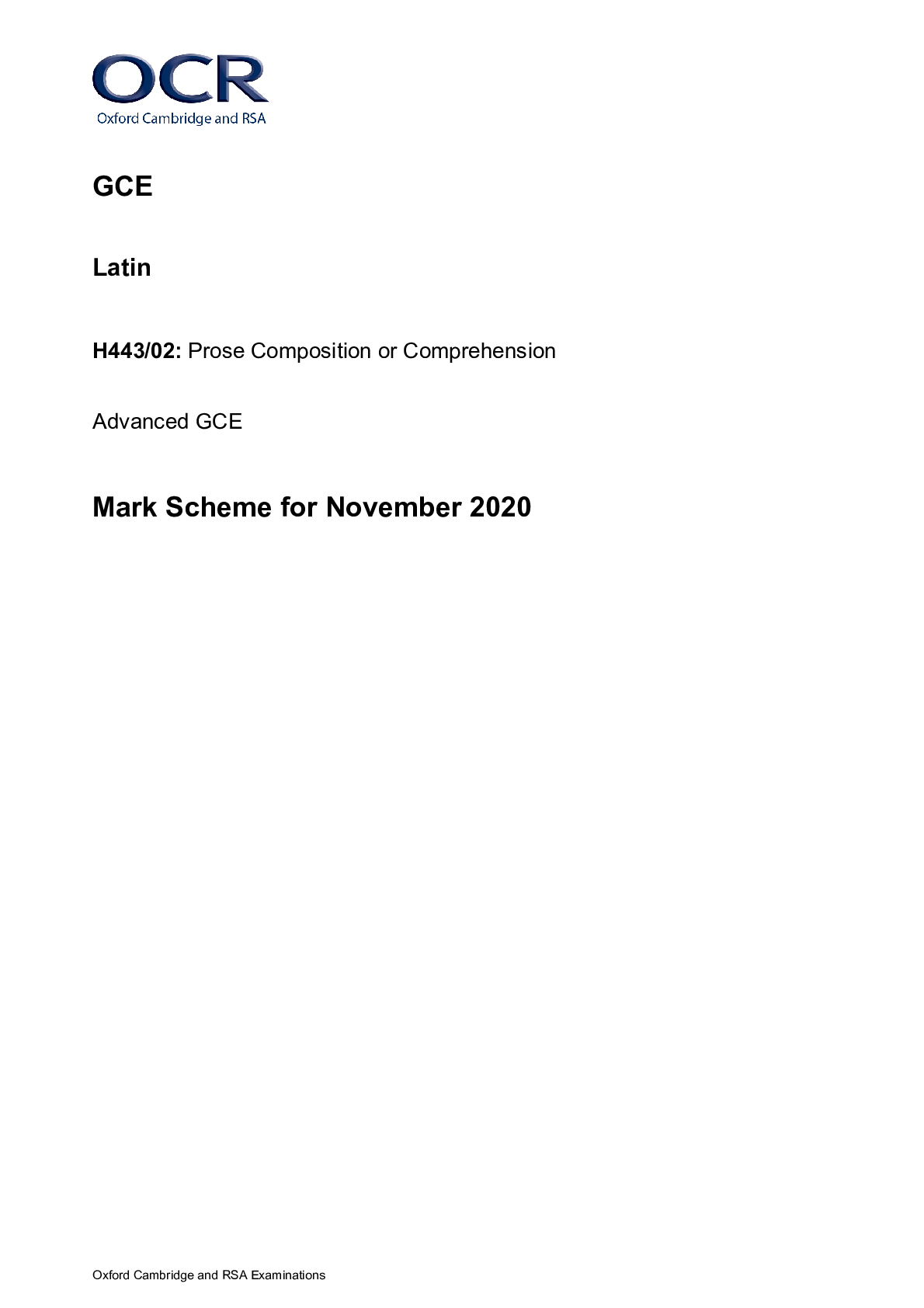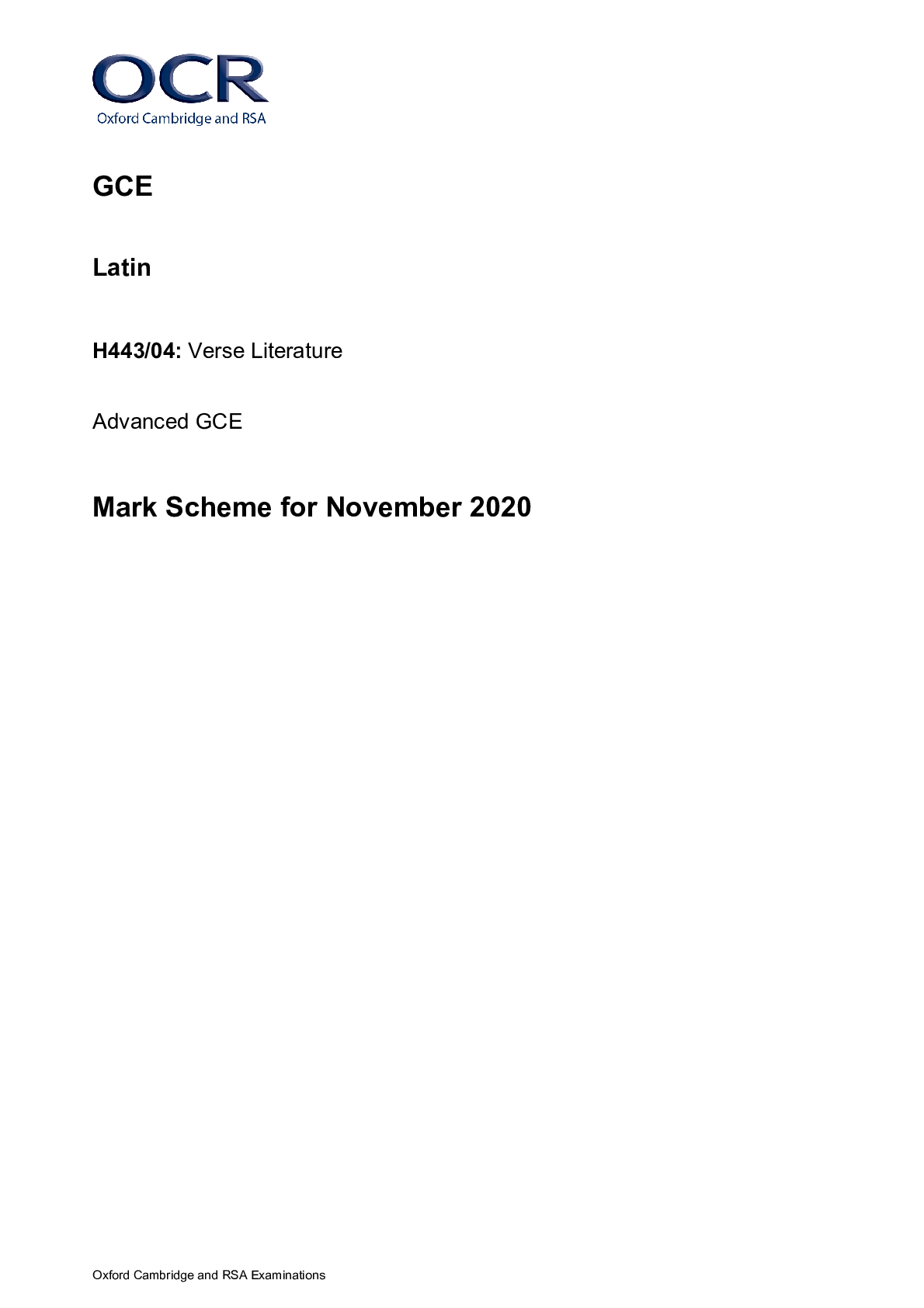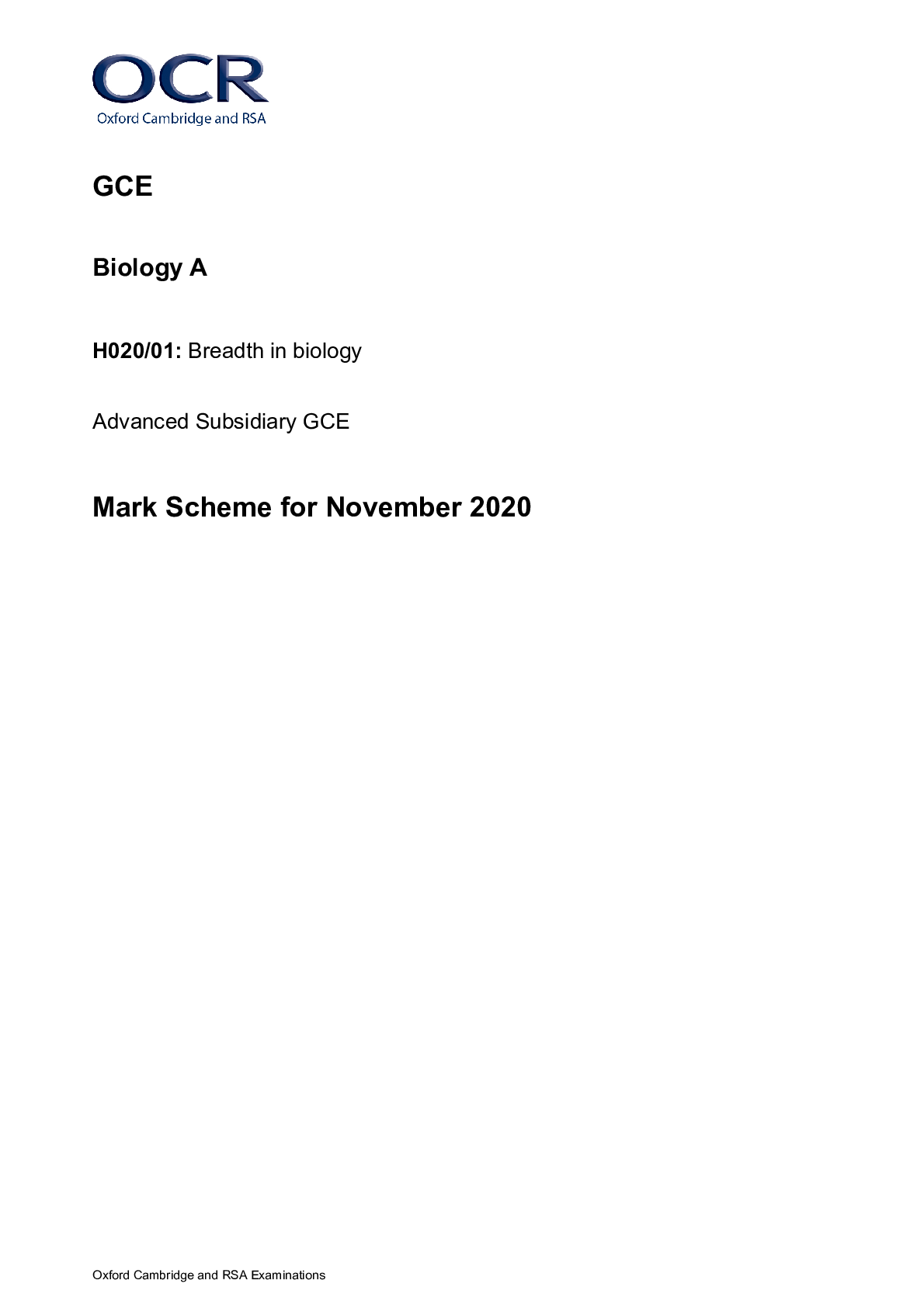Greek > GCSE MARK SCHEME > GCSE (9–1) Classical Greek J292/02: Prose Literature A General Certificate of Secondary Education (All)
GCSE (9–1) Classical Greek J292/02: Prose Literature A General Certificate of Secondary Education Mark Scheme for November 2020
Document Content and Description Below
GCSE (9–1) Classical Greek J292/02: Prose Literature A General Certificate of Secondary Education Mark Scheme for November 2020 Oxford Cambridge and RSA Examinations GCSE (9–1) Classical Gr... eek J292/02: Prose Literature A General Certificate of Secondary Education Mark Scheme for November 2020Oxford Cambridge and RSA Examinations OCR (Oxford Cambridge and RSA) is a leading UK awarding body, providing a wide range of qualifications to meet the needs of candidates of all ages and abilities. OCR qualifications include AS/A Levels, Diplomas, GCSEs, Cambridge Nationals, Cambridge Technicals, Functional Skills, Key Skills, Entry Level qualifications, NVQs and vocational qualifications in areas such as IT, business, languages, teaching/training, administration and secretarial skills. It is also responsible for developing new specifications to meet national requirements and the needs of students and teachers. OCR is a not-for-profit organisation; any surplus made is invested back into the establishment to help towards the development of qualifications and support, which keep pace with the changing needs of today’s society. This mark scheme is published as an aid to teachers and students, to indicate the requirements of the examination. It shows the basis on which marks were awarded by examiners. It does not indicate the details of the discussions which took place at an examiners’ meeting before marking commenced. All examiners are instructed that alternative correct answers and unexpected approaches in candidates’ scripts must be given marks that fairly reflect the relevant knowledge and skills demonstrated. Mark schemes should be read in conjunction with the published question papers and the report on the examination. © OCR 2020J292/02 Mark Scheme November 2020 2 Annotations Annotation Meaning Valid style point (8-marker) / AO3 point (10-marker) Unclear/dubious point Benefit of doubt Consequential / repeated error Incorrect translation or interpretation or factual error Major error Minor error / SPAG Harmful addition Correct / positive mark / additional evidence (10-marker) Good content point (8-mark & 10-mark question) / 2-mark point in 4-mark AO3 question Weaker content point / 1-mark point in 4-mark AO3 question Omission mark highlight Harmless addition Blank Page – this annotation must be used on all blank pages within an answer booklet (structured or unstructured) and on each page of an additional object where there is no candidate response. Noted but no credit givenJ292/02 Mark Scheme November 2020 3 Question Answer Mark Guidance 1 (a) Libya AO2 1 Do not accept Ethiopia 1 (b) it is boiled [1] it comes from [all sorts of] four-footed animals [1] AO2 2 Accept four-legged 1 (c) those in authority [1] put it there at night [1] or the land produces it [1] AO2 3 1 (d) τὰς μὲν νύκτας (at night): secretive behaviour of the authorities [1] has led to supernatural alternative explanation [1] φασι (they say) [1] suggests it is unsubstantiated talk [1] ἐπιχώριοί (local people) [1] less reliable source (than οἱ ἐν τέλει ὄντες), presenting the idea of a self-stocking Table as primitive folklore [1] the more plausible explanation is longer / comes first [1] AO3 2 Accept any justified personal response which demonstrates understanding of the Greek (Greek quotation not required) 1 mark for showing knowledge of the Greek 1 mark for addressing the question 2 (a) Cambyses AO2 1 2 (b) Accept any two points and award up to two marks each. Assess against point-by-point marking grid below. 2 expresses a valid point based on a relevant aspect of content or aspect of literary style, with accurate, relevant and suitably explained reference to the Greek 1 expresses a valid point, but is not fully supported by an appropriate selection of content or aspect of literary style or reference to the Greek 0 Point is not valid, or none are drawn AO3 4 Maximum 2 if both points rely upon Βασιλεὺς / βασιλεῖ.J292/02 Mark Scheme November 2020 4 Answers may include: • Βασιλεὺς ὁ Αἰθιόπων: establishes his authority • τῷ Περσῶν βασιλεῖ: on at least an equal footing with Cambyses; repetition / polyptoton • συμβουλεύει: patronising tone • Αἰθίοπας τοὺς μακροβίους: use of adjective ‘long-lived’ suggests the Ethiopians are a superior race • οὕτως εὐπετῶς: emphasis on the Ethiopians’ skill • τὰ τόξα ὄντα μεγέθει τοσαῦτα: implication that the Persians do not match the Ethiopians in strength • τότε… ἐπὴν… μέχρι δὲ τούτου: indefinite time phrases convey confidence that the Persians would fail at such a challenge • θεοῖς εἰδέναι χάριν: ‘count your lucky stars’ – threatening tone • γῆν ἄλλην προσκτᾶσθαι τῇ ἑαυτῶν: criticism of Persian imperialism; claims moral superiority for the Ethiopians. Guidance on applying the marking grids for the 5-mark set text translation The mark scheme awards marks for the proportion of sense communicated. If a candidate has communicated the ‘gist’ of a sentence (e.g. they know who has done what to whom) they will score 5, 4 or 3 marks. If they have not understood the basic sense of the sentence, they will score a maximum of 2. A completely correct translation with no omissions or errors will always score 5. The key judgment for a candidate who has demonstrated understanding of the overall meaning of the sentence is whether they should score 5, 4 or 3. This will depend on the gravity of their errors/omissions and may depend on the number of words in the sentence to be translated or the difficulty of the Greek and is usually decided at standardisation after a judgment has been formed about the performance of candidates. The final decisions on what constitute ‘inconsequential’ and ‘more serious errors’ will be made and communicated to assessors via the standardisation process (after full consideration of candidates’ responses) and these decisions will be captured in the final mark scheme for examiners and centres. A word containing more than one error should be treated as a maximum of one serious error. Repeated and consequential vocabulary errors should not be penalised.J292/02 Mark Scheme November 2020 5 Marks Description 5 Perfectly accurate with no errors or omissions, or one inconsequential error. 4 Essentially correct but two inconsequential errors or one more serious error. 3 Overall meaning clear, but more serious errors or omissions. 2 Part correct but with overall sense lacking/unclear. 1 No continuous sense; isolated knowledge of vocabulary only. 0 = No response or no response worthy of credit. Question Answer Mark Guidance 3 Assess against criteria in the 5-mark AO2 grid (see above) δεύτερον δὲ περὶ τοῦ χρυσοῦ περιαυχενίου ἤρετο καὶ περὶ τῶν ψελίων· ἐξηγουμένων δὲ τῶν ᾿Ιχθυοφάγων, γελάσας ὁ Βασιλεὺς καὶ νομίσας αὐτὰ εἶναι πέδας εἶπεν ὡς παρ’ ἑαυτοῖς εἰσι ῥωμαλεώτεραι τούτων πέδαι. Suggested translation: (And) secondly he asked about the golden necklace and about the bracelets; and when the Fish-Eaters explained the king laughed and, thinking them to be/that they were chains, said that among themselves/his own people there were stronger chains than these. AO2 5 Accept ‘twisted golden necklace’ (harmless addition) γελάσας… νομίσας: ‘laughed…thought’ provided that the participles are co-ordinated with the main verb (εἶπεν) Inconsequential καὶ νομίσας: omission of καὶ More serious παρ’ ἑαυτοῖς: omission of the phrase = a single major error 4 (a) ἐπύθετο αὐτοῦ τὴν ποίησιν [1] he asked/found out about the making of it [1] or ὑπερησθεὶς τῷ πώματι [1] delighted with/by the drink [1] AO2/ AO3 1+1 One mark for selecting an appropriate Greek phrase [AO3], one for translation [AO2]. Translation must match the Greek phrase quoted.J292/02 Mark Scheme November 2020 6 4 (b) • (They said that) they/the Persians ate bread [1] • 80 years was the longest a Persian lived [1] AO2 2 Question Answer Mark Guidance 5 Accept any two points and award up to two marks each. Assess against point-by-point marking grid below. 2 expresses a valid point based on a relevant aspect of content or aspect of literary style, with accurate, relevant and suitably explained reference to the Greek 1 expresses a valid point, but is not fully supported by an appropriate selection of content or aspect of literary style or reference to the Greek 0 Point is not valid, or none are drawn Answers may include: • ἀφ’ ἧς λουόμενοι λιπαρώτεροι ἐγίγνοντο: the water made people sleeker; slippery effect of λ-alliteration • καθάπερ εἰ ἐλαίου ἡ κρήνη εἴη: like oil • ὦζε δ’ ἀπ’ αὐτῆς ὡς εἰ ἴων: violet-scented - surprising detail • ἀσθενὲς… οὕτω… ὥστε: lightness/weakness of the water stressed by promotion of ἀσθενὲς and use of result clause • μηδὲν οἷόν τ’ εἶναι ἐπ' αὐτοῦ ἐπιπλεῖν: nothing could float on it • μηδὲν…μήτε…μήτε: repeated negatives emphasise unusually low density of the water AO3 4 θαῦμα δὲ ποιουμένων τῶν κατασκόπων περὶ τῶν ἐτῶν, ἐπὶ κρήνην αὐτοῖς ἡγήσατο ἀφ’ ἧς λουόμενοι λιπαρώτεροι ἐγίγνοντο, καθάπερ εἰ ἐλαίου ἡ κρήνη εἴη, ὦζε δ’ ἀπ’ αὐτῆς ὡς εἰ ἴων. ἀσθενὲς δὲ τὸ ὕδωρ τῆς κρήνης ταύτης οὕτω δή τι ἔλεγον εἶναι οἱ κατάσκοποι ὥστε μηδὲν οἷόν τ' εἶναι ἐπ' αὐτοῦ ἐπιπλεῖν, μήτε ξύλον μήτε ὅσα ξύλου ἐστὶν ἐλαφρότερα, ἀλλα πάντα χωρεῖν εἰς βυθόν. When the spies were amazed at the [number of] years, he led them to a spring from which, through washing, they became sleeker, as though the spring were of oil, and there was a smell from it as of violets. But so weak indeed did the spies say the water was from this spring that nothing could float upon it, neither wood nor anything that is lighter than wood, but everything sank to the bottom.J292/02 Mark Scheme November 2020 7 • ἀλλὰ πάντα χωρεῖν εἰς βυθόν: everything sank to the bottom; underlined by use of πάντα and emphatic final position of βυθόν.J292/02 Mark Scheme November 2020 8 Guidance on applying the marking grids for the 8-mark extended response This question focuses on candidates’ ability to select relevant examples of content and literary style and to structure an answer around these examples to express relevant points. Therefore candidates will be assessed on the quality of the points made and the range and quality of the examples they have selected from the passage. Examiners must use a best fit approach to the marking grid. Where there are both strengths and weaknesses in a particular response, examiners must carefully consider which level is the best fit for the performance overall. 8-mark grid for the extended response question AO3 = 8 marks = Analyse, evaluate and respond to literature Level Marks Description 4 7–8 • very good engagement with the question • expresses a range of relevant points, with good development, drawn on a range of well selected aspects of content and features of literary style, with a good range of appropriate quotation with well thought out discussion The response is logically structured, with a well-developed, coherent line of reasoning. 3 5–6 • good engagement with the question • expresses a range of sound points, with some development, drawn on a range of relevant aspects of content and features of literary style, with a range of appropriate quotation, with sound discussion The response is well structured with a clear line of reasoning. 2 3–4 • some engagement with the question • expresses some points drawn on a limited range of aspects of content and/or features of literary style, with some appropriate quotation and some discussion The response presents a line of reasoning which is mostly relevant but may lack structure. 1 1–2 • little engagement with the question • expresses points which are of little relevance and are supported with little evidence from the set text The information is communicated in an unstructured way.J292/02 Mark Scheme November 2020 9 Question Answer Mark Guidance 6 Assess against criteria in the 8-mark AO3 grid (see above). Answers may include: • αὐτίκα: impetuous response from Cambyses • ὀργὴν ποιησάμενος: reacts with fury • ἐστρατεύετο: he marched out (at once) • οὔτε παρασκευὴν σίτου οὐδεμίαν παραγγείλας: total lack of preparation emphasised by repeated negatives (another follows in the next clause) • οὔτε λόγον ἑαυτῷ δοὺς: lack of forethought; rash decision • τὰ ἔσχατα γῆς: he was heading into unknown, probably hostile conditions; superlative ἔσχατα emphasises this • ἐμμανής...καὶ οὐ φρενήρης: tautology; C. was out of his mind • ἤμελλε στρατεύσεσθαι… ὡς ἤκουσε: repetition of ideas from start of sentence (ἀπαγγειλάντων… ἐστρατεύετο) underlines C’s hasty reaction to the spies’ report • πάντα τὸν πεζὸν ἅμα ἀγόμενος: huge army (stressed by πάντα) without provisions – a recipe for disaster AO3 8 ἀπαγγειλάντων δὲ τῶν κατασκόπων ταῦτα, αὐτίκα ὁ Καμβύσης ὀργὴν ποιησάμενος ἐστρατεύετο ἐπὶ τοὺς Αἰθίοπας, οὔτε παρασκευὴν σίτου οὐδεμίαν παραγγείλας οὔτε λόγον ἑαυτῷ δοὺς ὅτι εἰς τὰ ἔσχατα γῆς ἤμελλε στρατεύσεσθαι· οἷα δὲ ἐμμανής τε ὢν καὶ οὐ φρενήρης, ὡς ἤκουσε τῶν ᾿Ιχθυοφάγων, ἐστρατεύετο πάντα τὸν πεζὸν ἅμα ἀγόμενος. When the spies reported these things, Cambyses was immediately angered and started a military expedition against the Ethiopians, having neither issued orders for any preparation of food nor giving any thought to himself, that he was about to march to the ends of the earth; and since he was mad and not of sound mind, when he heard from the Fish-Eaters, he marched leading all the infantry with him.J292/02 Mark Scheme November 2020 10 Question Answer Mark Guidance 7 (a) (some) Greeks and (Callatian) Indians [1] AO2 1 Both groups needed for one mark Accept Callatiae / a remote Indian tribe 7 (b) The Greeks said nothing (no price) [1] would induce them to eat their deceased father(s) / fathers’ bodies. [1] The Indians/Callatians, who eat their parents (after death) [1], when asked for what payment they would agree to burn their fathers when they died [1] were horrified / told him to be quiet / refrain from words of ill omen.[1] AO2 3 Any three points to make a coherent summary, which must convey the contrast in attitude between the two groups. Reference to one group only: maximum 1 mark 7 (c) In the sentence preceding this passage Herodotus writes ‘Everyone thinks that his own race’s customs are by far the best’ [1] Commentary on this might include: The ‘experiment’ of Darius is offered as proof / evidence [1] Herodotus is showing that even the greatest taboos are relative and culture-dependent / not based on any absolute truth [1] AO3 2 Maximum 1 mark if no awareness of Herodotus’ expressed purpose in narrating the story (eg. ‘He wanted to shock his readers.’) 1 mark for reference to introductory sentence 1 mark for any sensible evaluative responseJ292/02 Mark Scheme November 2020 11 Guidance on applying the marking grids for the 10-mark extended response Two Assessment Objectives are being assessed in this question; AO2 (Demonstrate knowledge and understanding of literature) and AO3 (Analyse, evaluate and respond to literature). The two Assessment Objectives are equally weighted. Examiners must use a best fit approach to the marking grid. Where there are both strengths and weaknesses in a particular response, particularly imbalanced responses in terms of the assessment objectives, examiners must carefully consider which level is the best fit for the performance overall. For example, you should not be able to achieve a mark of 8 made up of AO2 = 6 and AO3 = 2. Responses are credited for AO2 for the detail and accuracy of the knowledge of the set text they deploy and for their understanding of the set text. Responses are credited for AO3 for how well the response addresses the question, for candidates selecting relevant examples from the set texts they have studied and drawing and expressing conclusions based on the selected examples in relation to the question posed. Candidates will be assessed on the quality of the conclusions and points they argue and the range and quality of the examples they have selected. In relation to this question (‘Herodotus portrays Persian rulers as over-confident and narrow-minded.’ How far do you agree?) details about Herodotus’ portrayal of Cambyses and Darius would be evidence of AO2, whilst using this evidence to evaluate the question would be evidence of AO3. 10-mark grid for the extended response question AO2 = 5 marks = Demonstrate knowledge and understanding of literature AO3 = 5 marks = Analyse, evaluate and respond to literature Level Marks Characteristics of performance 5 9–10 • detailed knowledge and excellent understanding of the set text (AO2) • well-argued response to the question which is supported by a range of well-selected examples from the set text (AO3) The response is logically structured, with a well-developed, sustained and coherent line of reasoning 4 7–8 • good knowledge and sound understanding of the set text (AO2) • a good response to the question which is supported by some well-selected examples from the set text (AO3) The response is logically structured, with a well-developed and clear line of reasoning. 3 5–6 • some knowledge and understanding of the set text (AO2) • a reasonable response to the question which is supported by some examples from the set text (AO3) The response presents a line of reasoning which is mostly relevant and has some structure. 2 3–4 • limited knowledge and understanding of the set text (AO2) • a limited response to the question which is occasional supported by reference to the set text (AO3) The response presents a line of reasoning but may lack structure.J292/02 Mark Scheme November 2020 12 1 1–2 • very limited knowledge and understanding of the set text (AO2) • a very limited response to the question with very limited reference to the set text (AO3) The information is communicated in an unstructured way. 0 = No response worthy of credit. Question Answer Mark Guidance 8 ‘Herodotus portrays Persian rulers as over-confident and narrow-minded.’ How far do you agree? Assess against criteria in the 10-mark essay grid (see above). Arguments may include (AO3): Two Persian rulers feature in the prescribed text: Cambyses and Darius, though the latter only in a brief anecdote. Herodotus’ account of Cambyses’ dealings with the Ethiopians strongly supports the statement: he is shown as aggressive, expansionist, deceptive and foolhardy. His narrow-minded assumptions about Persian cultural superiority – and his limited knowledge of the Ethiopians – may be deduced from the choice of gifts sent, ostensibly to woo the Ethiopian king; and he exhibits perilous over-confidence in reacting explosively to his spies’ report and embarking without forethought on a doomed exhibition. On the other hand, his imperialist ambitions could argue against an insular outlook, and his preliminary factfinding mission, while tactical, might suggest a readiness to learn about other cultures. In the second, short passage there is no suggestion of overconfidence in Darius, who comes across as the opposite of narrow-minded in promoting intercultural understanding: his ‘experiment’ illustrates that one nation’s established norms can be abhorrent to another. Supporting evidence from the prescribed text (AO2). 10 made up of AO2 = 5 & AO3 = 5 Maximum 8 if no mention of Darius.J292/02 Mark Scheme November 2020 13 (underlined = sections outside those printed on the QP): XV(B) The Ethiopians • Cambyses planned an expedition against the ‘long-lived’ Ethiopians, ‘the tallest and fairest of all men’ (over-confident to take on such an impressive race of people). • They lived ‘in Libya near the southern sea’ (African coast of the Indian ocean, modern Somalia – ie a long way away) • He sent spies first to investigate the ‘Table of the Sun’ (outward-looking, sensible to use the fish-eaters, who knew the Ethiopian language) and to spy out other things on the pretext of a diplomatic embassy (over-confident – the Ethiopian king saw through him) • He sent gifts highly valued by the Persians (a purple cloak, golden jewellery, perfume and wine) which mostly failed to impress the Ethiopian king (over-confident, narrow-minded). • Ethiopian king rejected the overtures of an unjust aggressor with a confident and threatening reply. (Passage 2) • The spies learned about the Long life of the Ethiopians (120 years), their diet and the miraculous (life-prolonging?) power of a local fountain • Cambyses reacted furiously to the spies’ report and embarked in a frenzy upon an ill-planned expedition against the Ethiopians with all his infantry (Passage 6) • Facing starvation in the desert, the Persians resorted first to eating their beasts of burden and then to cannibalism. Only then did Cambyses see sense and abandon the expedition. XX. The Power of Custom Darius is presented as open-minded and not over-confident: • Herodotus’ opening sentence: ‘Each [race of men] thinks that his own race’s customs are by far the best.’J292/02 Mark Scheme November 2020 14 Darius’ experiment is an argument against bigoted insularity. • Passage 7: Darius communicates with the Callatians through interpreters, with the Greeks present for a lesson in cultural relativism.OCR (Oxford Cambridge and RSA Examinations) The Triangle Building Shaftesbury Road Cambridge CB2 8EA OCR Customer Contact Centre Education and Learning Telephone: 01223 553998 Facsimile: 01223 552627 [Show More]
Last updated: 1 year ago
Preview 1 out of 16 pages
Instant download
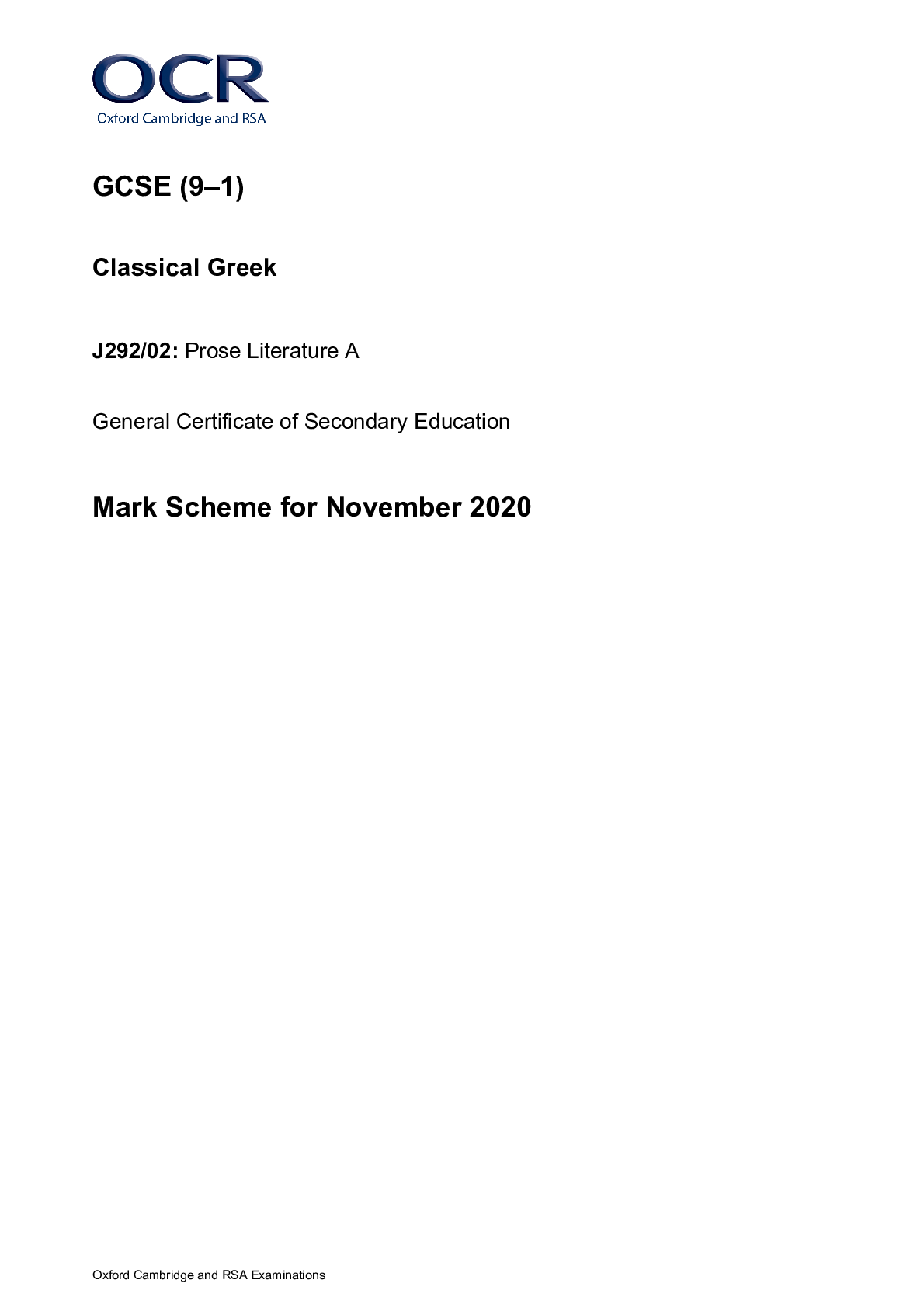
Buy this document to get the full access instantly
Instant Download Access after purchase
Add to cartInstant download
Reviews( 0 )
Document information
Connected school, study & course
About the document
Uploaded On
Oct 07, 2022
Number of pages
16
Written in
Additional information
This document has been written for:
Uploaded
Oct 07, 2022
Downloads
0
Views
54

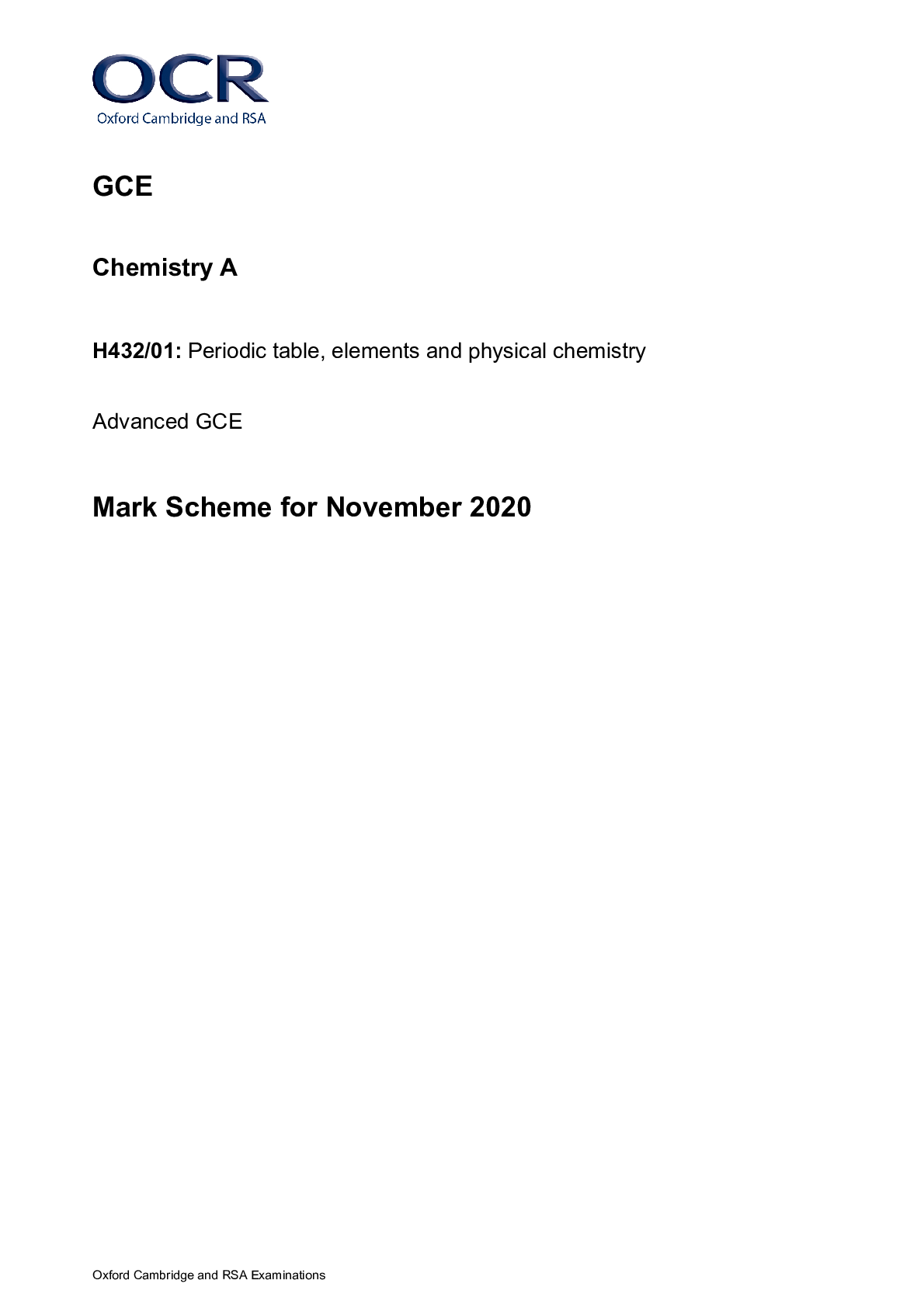

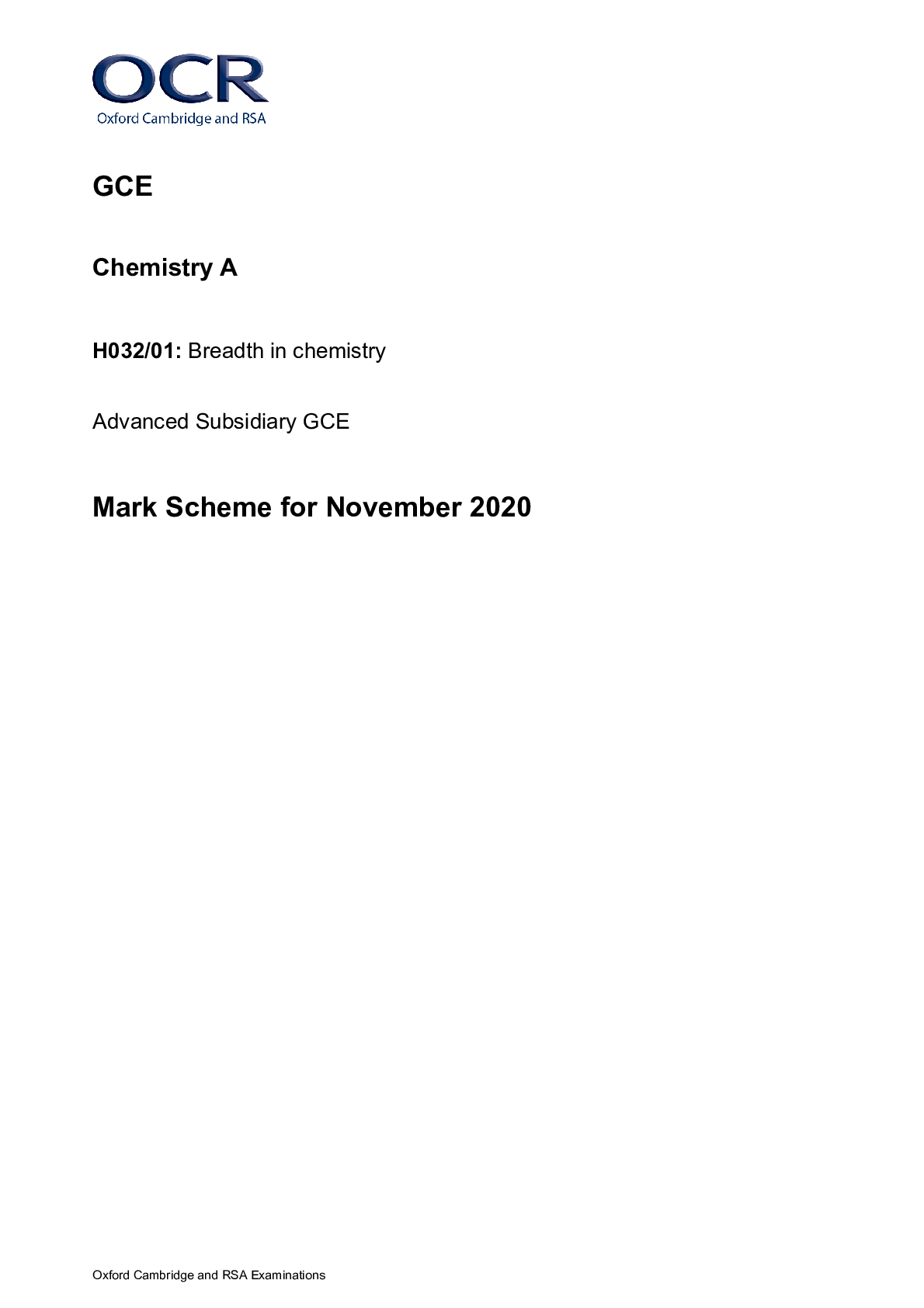
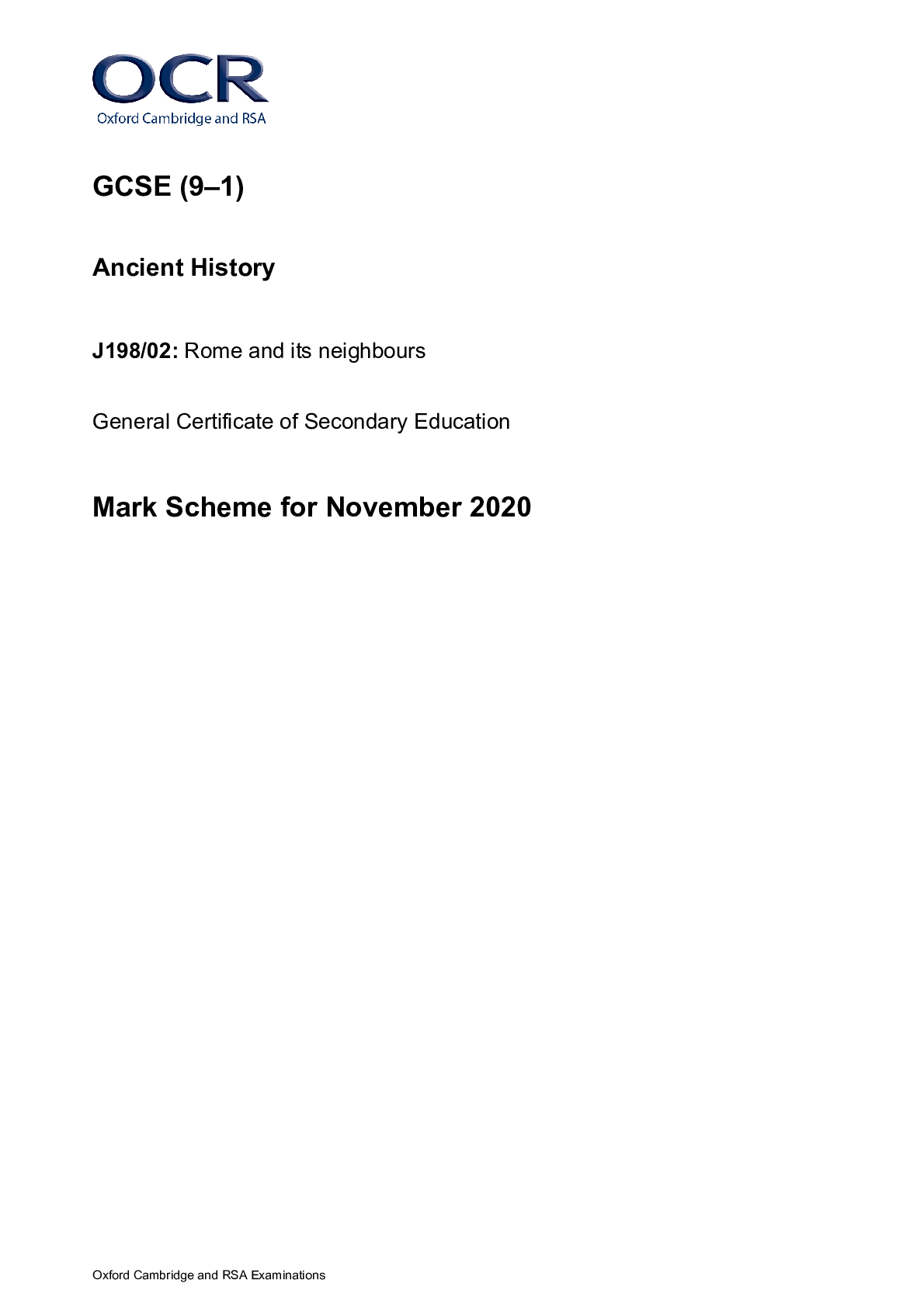

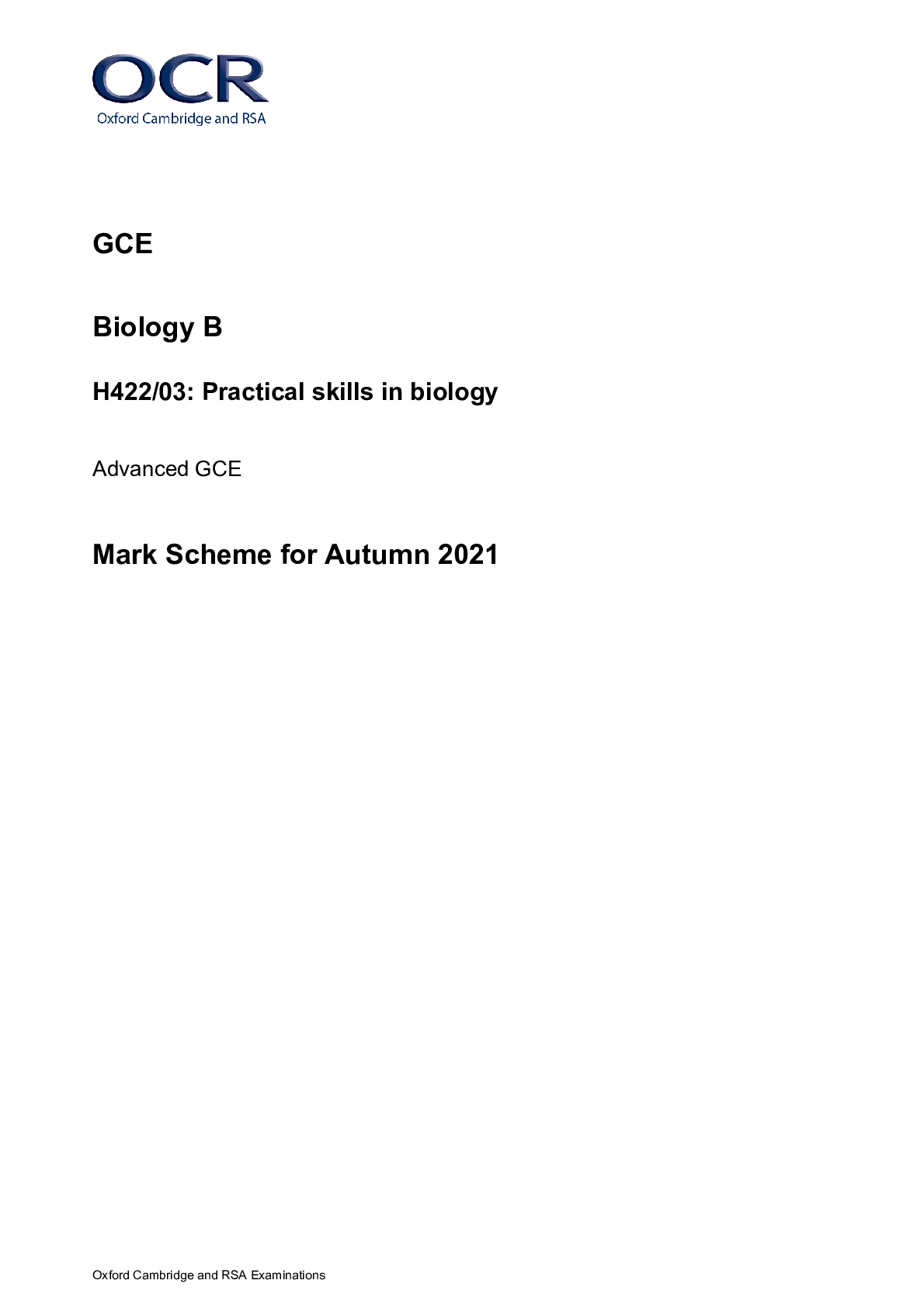

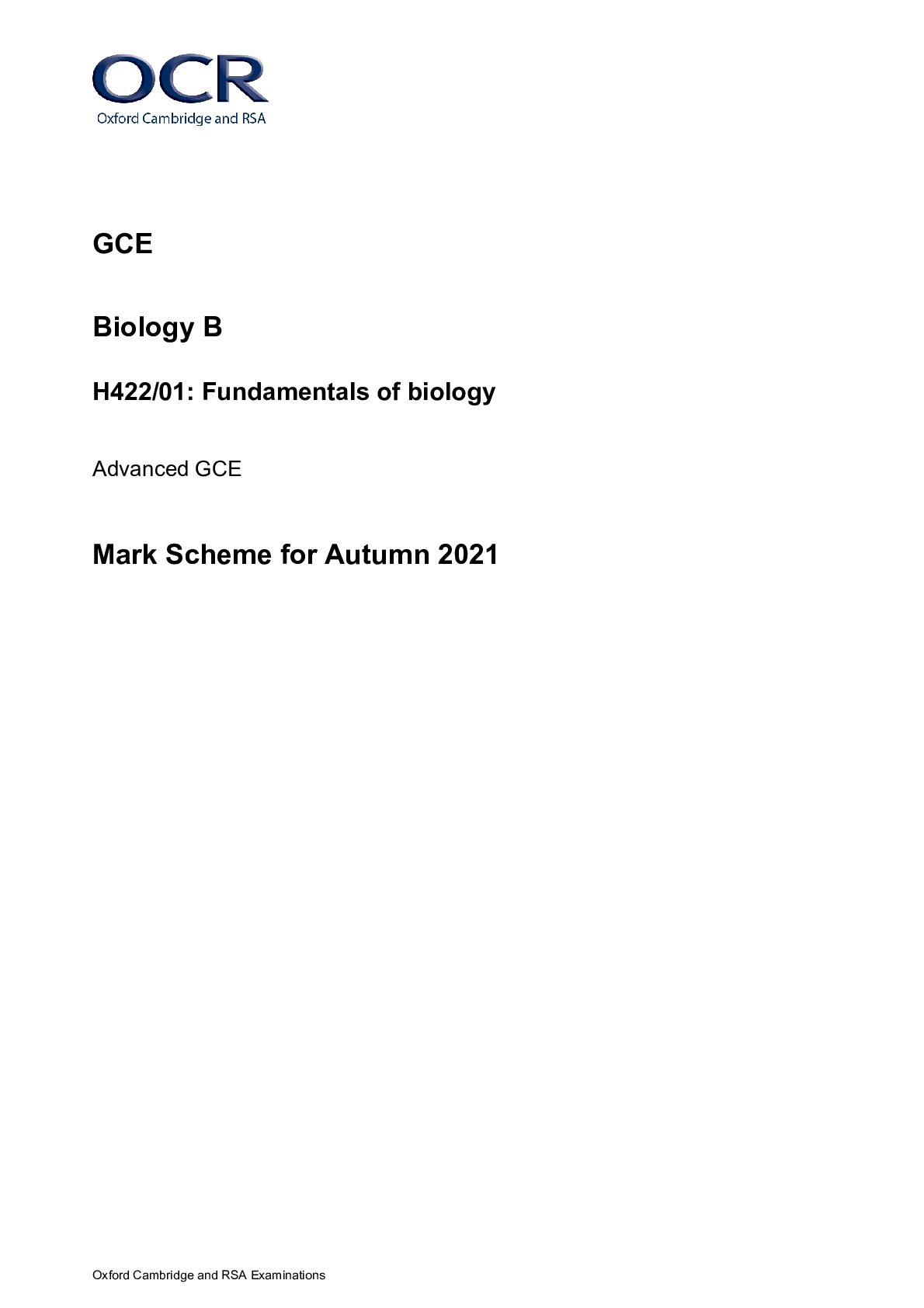
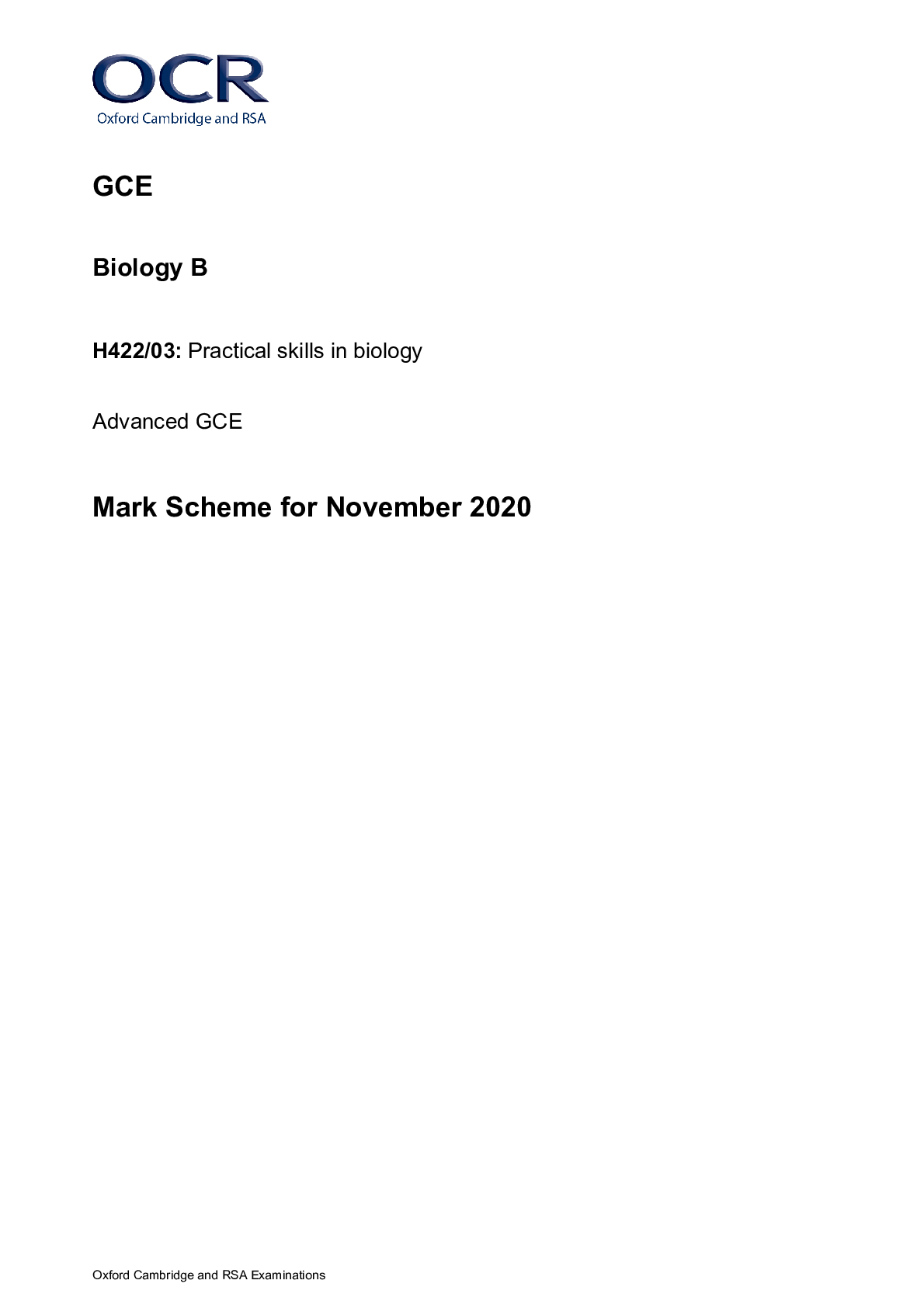
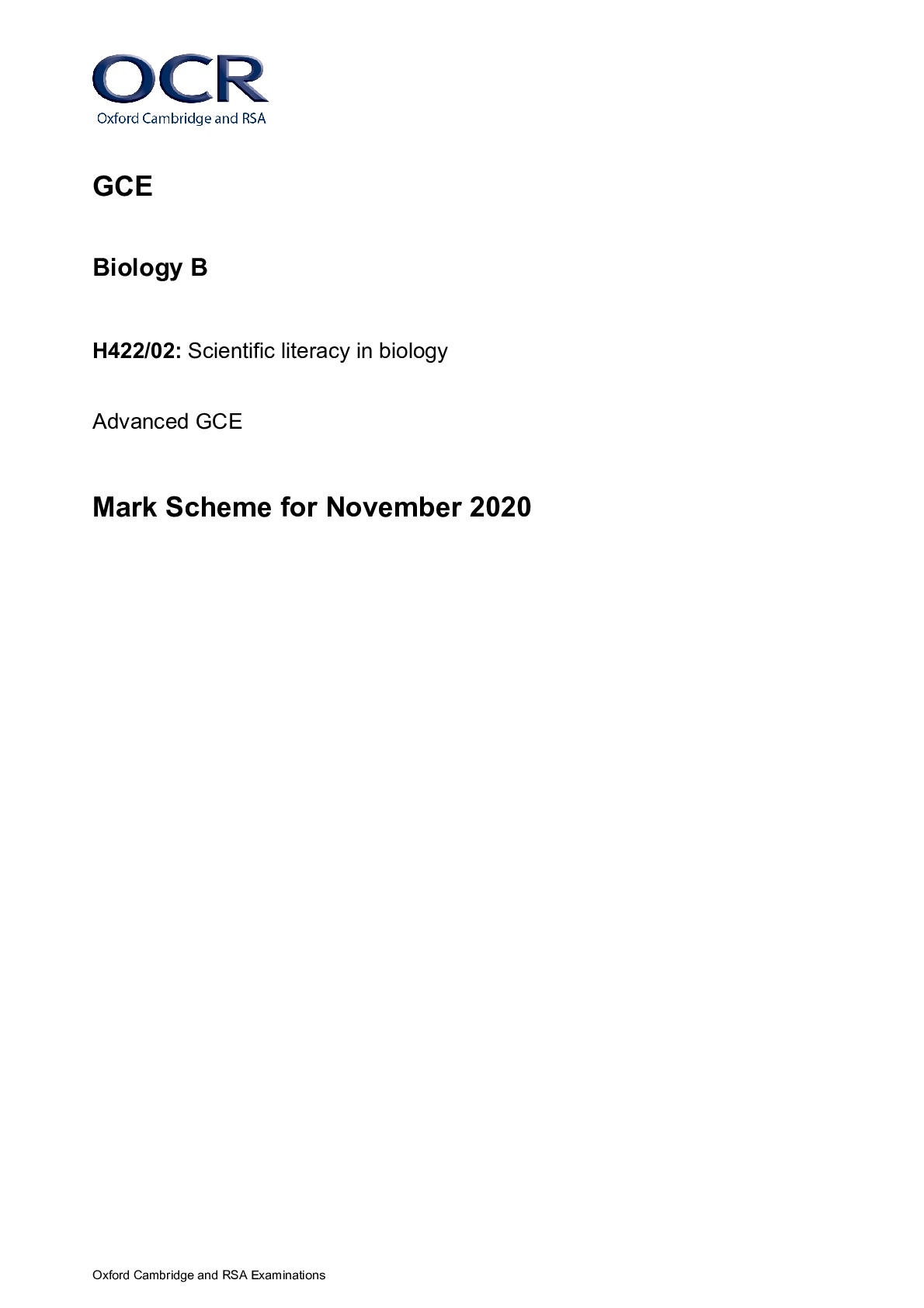
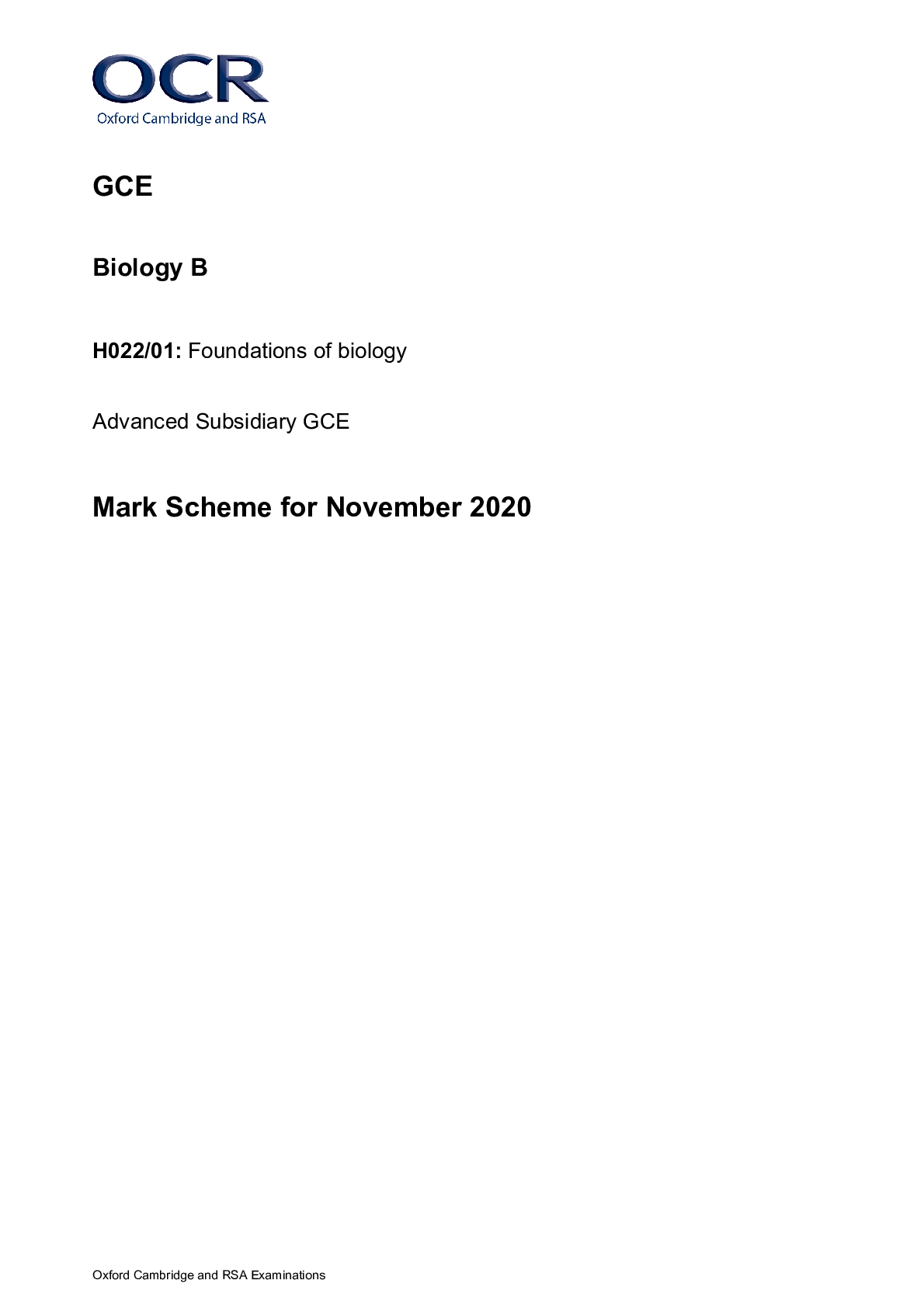

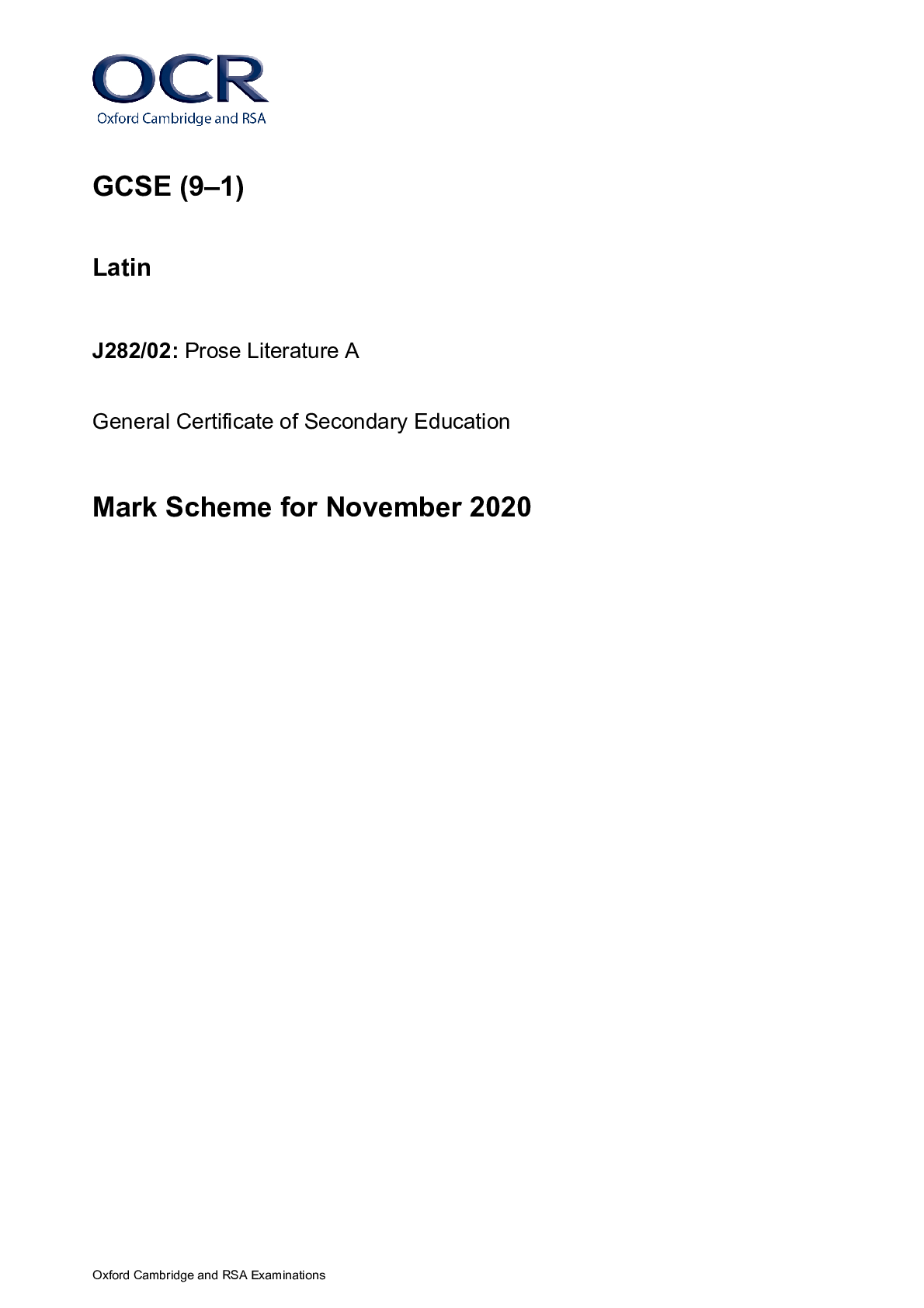
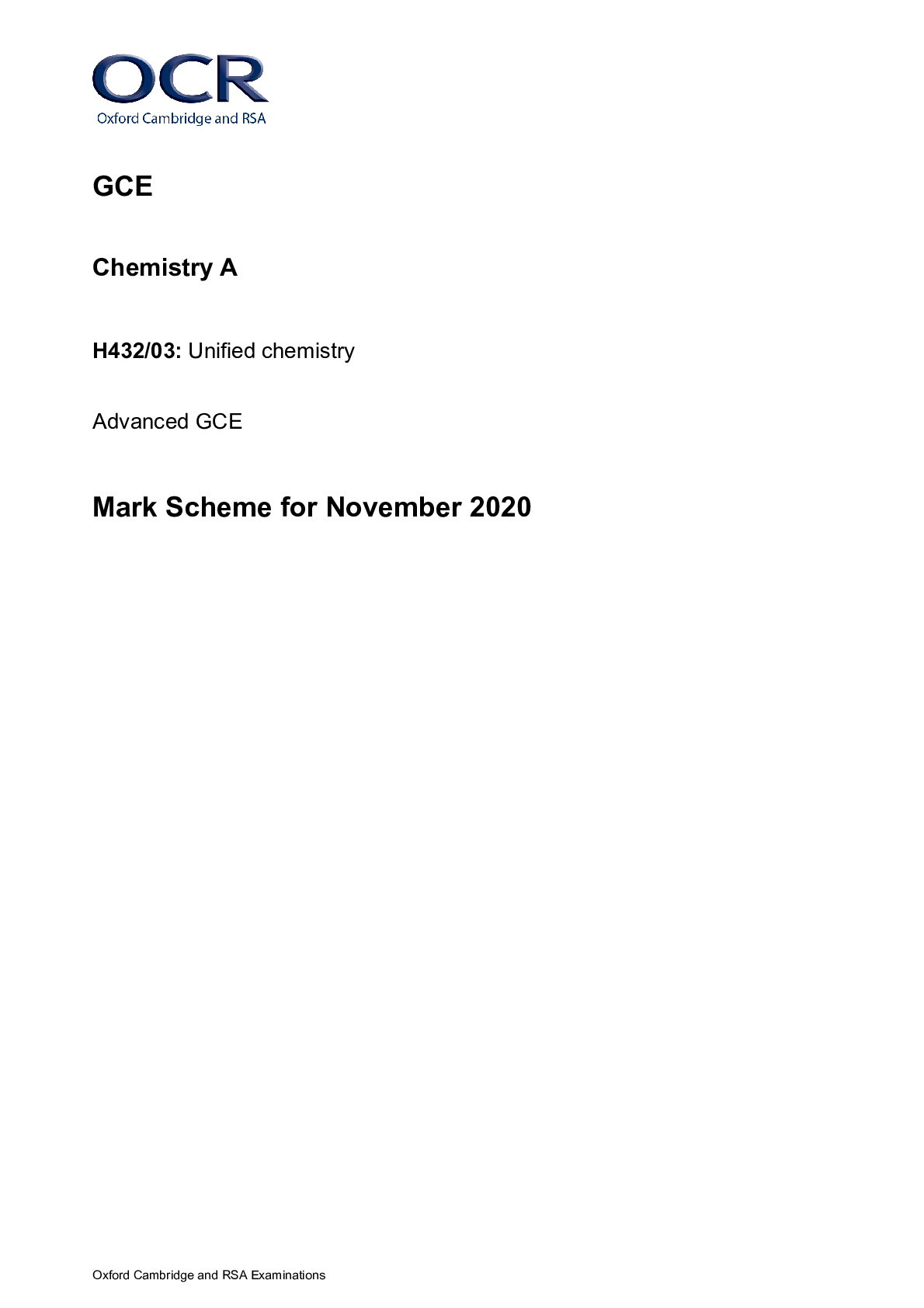
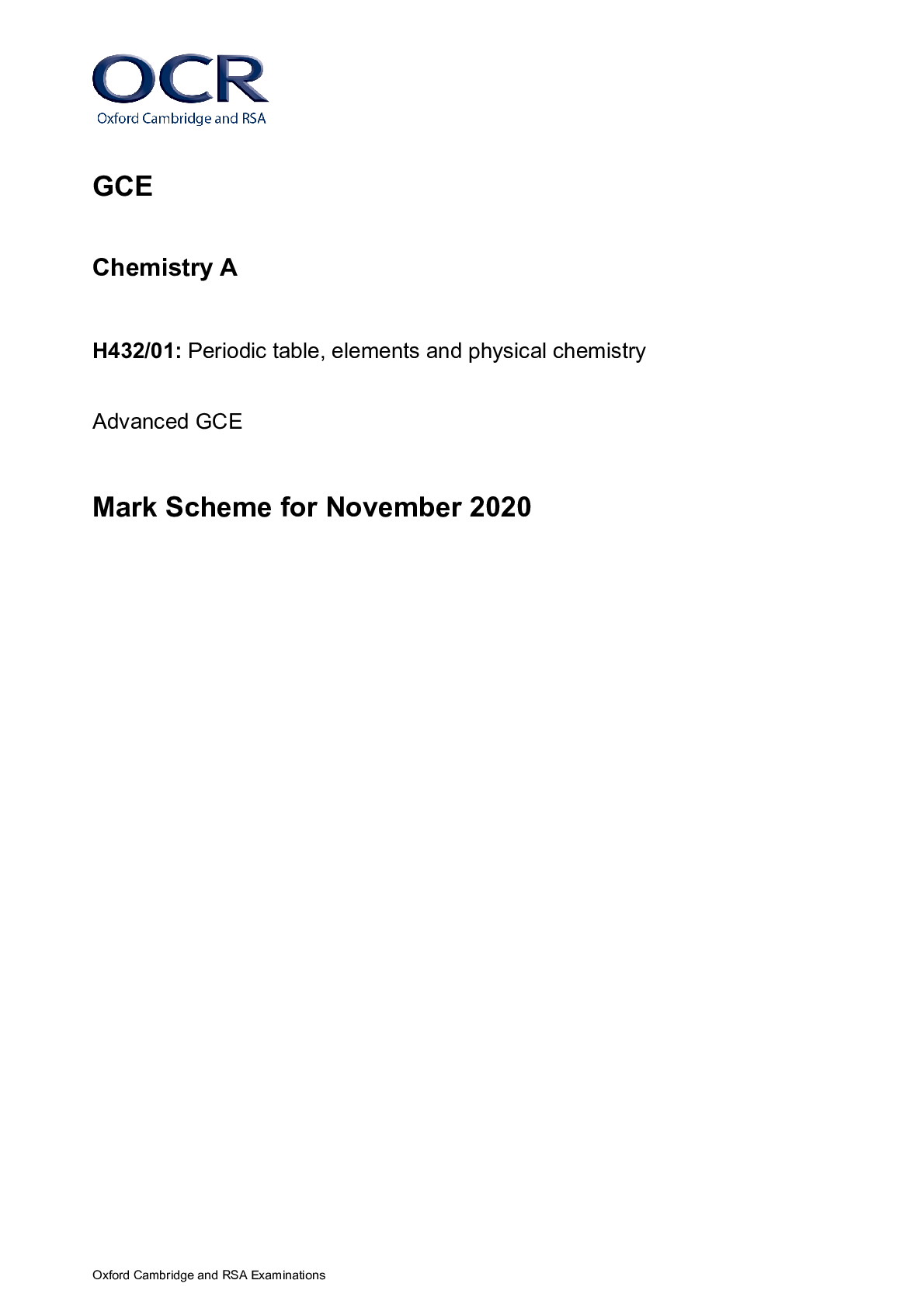
.png)
